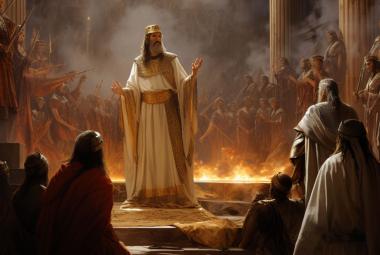Some call the Book of Zechariah, "The Apocalypse of the Old Testament." The book is particularly timely today as it focuses on the siege of Jerusalem by the collective Gentile powers on Planet Earth - a circumstance that is shaping up as you are reading this article! (It also seems to suggest the use of neutron bombs1 and gives us the only physical description of the Antichrist found in Scripture.2)
Many feel that Zechariah is the most Messianic book of the Old Testament. Among its many precious passages we find the Messiah presented as the Branch who will remove iniquity; the Shepherd; the Stone; the Coming King; the Triumphal Entry on a donkey; One betrayed for 30 pieces of silver; His Crucifixion, and His Second Coming, "looking upon me whom they pierced."
This most challenging little book is second only to Isaiah in its distinctiveness and importance as a Messianic prophet. Zechariah contains more Messianic prophecies than all of the other "Minor" prophets put together.3
The book focuses on the Day of YHWH, the return of Israel in unbelief, their passing through the Great Tribulation, and their deliverance by King Messiah. It also may hold the key to resolving the enigma of "Mystery Babylon" and its relation to literal Babylon in prophecy.4
The Prophet Zechariah was a Levite born in a priestly family in Babylon5 who returned to Jerusalem with almost 50,000 other Jewish exiles. [Both Jeremiah (Jer 1:1) and Ezekiel (Ezek 1:3) were also priests.6]
He was probably a relatively young man at the beginning of his prophetic ministry. Zechariah was a contemporary of Haggai the prophet, Zerubbabel the governor, and Joshua the high priest.7
Historical Background
The fall of Jerusalem to the armies of Nebuchadnezzar in 586 b.c. marked the finale of the Southern Kingdom of Judah, much as the earlier defeat at the hands of the Assyrians in 722 b.c. brought to an end the Northern Kingdom of Israel. Most of Jerusalem's inhabitants were deported to Babylon for a period of 70 years, as prophesied by the Prophet Jeremiah. 8
During this exile, the Prophet Daniel received the revelation that Gentile kingdoms would be dominant over Judah and Israel until God set up His kingdom on the earth under the rule of the Messiah. 9 This period was referred to by Jesus Christ as "the times of the Gentiles".10
When the Babylonian Empire fell to the Persian Empire (539 b.c.), Cyrus the Great decreed that the Jews could return to Jerusalem to rebuild their Temple.11 However, only a small minority of about 50,000 Jews (including Haggai and Zechariah) returned under the leadership of Zerubbabel the governor and Joshua the high priest.12
Levitical sacrifices were soon reinstituted on a rebuilt altar of burnt offering,13 and in the second year of their return the foundation of the Temple was laid.14 However, external oppression and internal depression halted the rebuilding of the Temple for about 16 more years of spiritual apathy until the rule of Persian King Darius Hystaspis (522-486 b.c.).
In the second regnal year of Darius (520 b.c.), God raised up Haggai the prophet to encourage the Jews in rebuilding.15 Haggai preached four sermons in four months and then disappeared from the scene. Two months after Haggai delivered his first sermon, Zechariah began his prophetic ministry,16 encouraging the people to spiritual renewal and motivating them to rebuild the Temple by revealing to them God's plans for Israel's future. With this prophetic encouragement the people completed the Temple reconstruction in 515 b.c.17
The dated portions of Zechariah's prophecy fall within the period of the rebuilding of the Temple. The undated prophecies of Zechariah 9-14 were probably written much later in his ministry. According to Jewish tradition, Zechariah was a member of the Great Synagogue, a council originated by Nehemiah and composed of 120 members. Ezra is said to have been the president of this council, which was later succeeded by the Sanhedrin.
An Enriching Adventure
Zechariah, in a sense, closes the Old Testament. Luke opens with the account of another priest named Zechariah ("Yahweh Remembers") and his wife Elisabeth ("His Oath"). An angelic visit ends 400 years of silence with the announcement of the forthcoming birth of John the Baptist.
This astonishing book is full of surprises - both Messianic and many apparently on our near horizon! It will be especially rewarding in both of these aspects! Good hunting!
Notes:
- Zech 14:4.
- Zech 11:17.
- "Minor" is a designation from their length (although Zechariah is the longest of them). In the Hebrew Scriptures, they are "The Twelve" and form a part of the nebhi'im 'aharonim, the latter prophets. Among these, Zechariah is the preeminent.
- Read the following six chapters at one sitting: Isaiah 13, 14; Jeremiah 50, 51; and Revelation 17, 18. Then consider Zechariah 5:5-15.
- Neh 12:1, 16.
- There are at least 30 "Zechariahs" in the OT.
- Ezra 5:1-2; Zech 3:1; 4:6; 6:11.
- Jer 25:11; 29:10.
- Dan 2; 7,
- Lk 21:24.
- 2 Chr 36:22-23; Ezra 1:2-4; cf. Isa 44:28.
- Ezra 2.
- Ezra 3:1-6.
- Ezra 3:8-13; 5:16.
- Ezra 5:1-2; Hag 1:1.
- Cf. Hag 1:1; Zech 1:1.
- Ezra 6:15.






